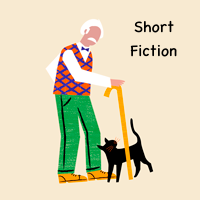When did my heart harden? How did empathy slip away? Dr. Lindelson pondered these questions in the spacious office where she had practiced psychotherapy for forty years, since she completed he ... [+]
He’s heard stories like it, but they’re never quite like his mother’s.
It goes like this: there is a man in the moon. No one knows how he came to live in the sky, how he came to call the white surface of the moon home, but he did. He watches from up in the stars, drawing a curtain of darkness across the moon’s bright light for half the month while revealing it the other.
He watches, and searches. See, his mother never outright told him so, but her voice always carried with it an air of warning, the story always told with the curtains drawn or during the nights when the sky was at its darkest. Because the Man in the Moon is watching, always watching, for those who step out of line.
It goes like this: there is a man in the moon. No one knows how he came to live in the sky, but he doesn’t want to be there. It’s cold, his mother said, cold and dark and lonely. She would always ask him next if he would like being somewhere cold and dark and lonely, and he would shake his head, shaggy hair flopping around his face still round with baby fat. The man in the moon doesn’t like being in the moon, but the only way he could leave is by getting someone to take his place.
And with all the bravado childhood gives, he would stick his tongue out and say there’s no way he’d ever go to the moon, no matter how much Georgie from second grade would boast about going there one day. If Georgie wanted to go, fine by him, but he likes it warm and bright and surrounded by people.
And his mother would smile in turn, brushing his hair from his eyes and kissing his forehead. But her smile never felt right, never looked right. She would tell him how the man in the moon, on nights when the moon glowed bright orange like a second sun, would look for his replacement. She would tell him, with that not right smile and a tremble in her fingers, to never go out when the moon was orange. Not alone, at least.
And he would nod his head and she would pat his cheek, tucking him in and leaving his nightlight on.
He would fall asleep, thankful for his warm bed and his parents in the next room over.
He felt bad for the man in the moon, but he had a home. And so, he listened to his mother’s warnings.
Right up until he didn’t.
It was a bright night. A night of summer heat and haze, one where the stars are at their brightest and the light of the moon at its peak. It glowed orange, that night, signaling to those below the coming of autumn. His science teacher called it a harvest moon, as farmers of old would use it to note the coming of fall, to harvest their crops before the rot set in.
His mother called it a hunter’s moon, the last chance to trap unwitting game happening under its red, red glow.
She tucked him in that night, even though he was older then. Old enough to think himself old and young enough not to realize how absurd that was. She ruffled his hair, kissed his cheek, and told him the story of her mother’s mother’s father before shutting his door with a soft click.
The funny thing about stories, is that every story has a meaning. Every story has a meaning, and any good story has a warning. Clear or not, it is wise to listen. But, then again, those young of heart rarely are, and rarely do.
He wakes up, that night, a breeze caressing his face so, so softly. His mother made sure to close the curtains, made sure to lock the window, but he paid no heed to that, and so it comes as no shock that they are wide open, soft, soft light trailing in.
Come, the light says, it is safe. You are safe.
He remembers his mother’s story, of course. She tells it to him every night, when the moon is at its darkest with the curtains drawn. But this night, the window is open and the moon is at its peak. She told, and he was not the only one listening.
Stories have meaning, and any good story has a warning. But a warning to one is an invitation to another.
He remembers his mother’s story, but stories have no place in dreams. And that is what this must be, he thinks, a dream.
Yes, the light agrees, the curtains shifting in the wind, swaying in laughter, a dream, this is. Come.
And he does, blankets long kicked onto the floor, all he must to is swing his legs over the bed and stand. Good, very good, the light praises, the breeze ruffling his shaggy hair. Come.
And he does, one step at a time. It is warm, so very warm, like a welcoming home in the middle of winter, a singular point of safety in a sea of bitter white.
And he does, one step at a time, right up until his foot steps on a toy his mother asked him time and time again to put away.
He yelps, stumbling back, and his blood runs cold.
Come, the light says, except there is no light. There is no light, no breeze, no warmth. Only a hand, black as night with nails as long as him and sharp as knives, caressing his cheek.
The spell shatters, his heart beating and lungs filling for a scream but—
The hand covers his mouth. Gentle, so gentle, but strong as iron and cold as ice.
Come, the light says, except there is no light, only darkness as one of the fingers covers his eyes and lifts him off his feet.
...
His mother told him a story, once. A story told to her by her mother, and to her mother by her father, stretching all the way back to the moment their family came to be.
It goes like this: there is a man in the moon. No one knows how he came to live in the sky, but he doesn’t want to be there. It’s cold, his mother said, cold and dark and lonely. The man in the moon doesn’t like being in the moon, but the only way he could leave is by getting someone to take his place.
Except, that wasn’t quite right. There is a man in the moon, and no one knows how he came to live in the sky, but he does want to be there. It is his home, after all, and it is cold and dark, but not lonely, never lonely.
There is no such thing as a lonely home, after all. Not if there is a family inside.
His mother told him a story, once. And it was wrong. It goes like this: there is a man in the moon. No one knows how he came to live in the sky, and he is jealous. It is lonely in the sky, empty in the moon. He does not take those who step out of line: he takes those who love. Those who love and hold others dear.
If they have room in their heart for others, they must have room for him.
His mother told him a story, once. She ruffled his hair, kissed his cheek, and loved him, and so he loved her back.
There is no such thing as a lonely home, after all. Not if there is a family inside. And the man in the moon has a family— they are his family. If they’re not, they will be.
They’ll learn. They must.



